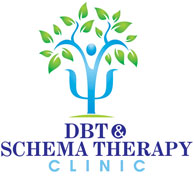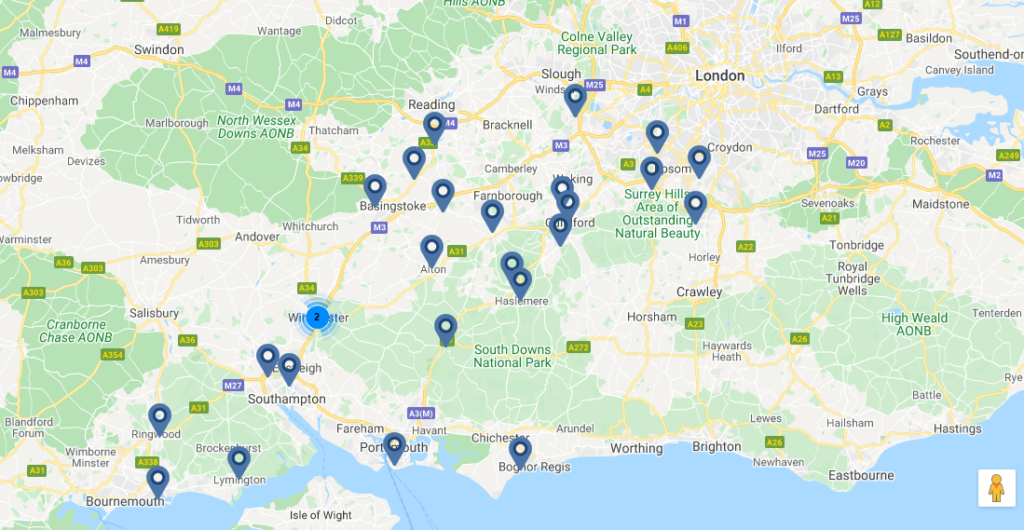Welcome to the Dialectical Behaviour Therapy (DBT) and Schema Therapy Clinic

The DBT and Schema Therapy clinic is specifically designed to help people with longstanding difficulties in emotion regulation and self-esteem who are not easily treated by short term therapy.
We have more than 10 specialist Psychologists working in different locations in the practice who are able to offer individual treatment using DBT and Schema Therapy. We can also work with family members who might be struggling to understand their loved one's difficulties.
We are able to offer Cognitive Analytic Therapy (CAT) which is also recommended for these types of difficulties.
We are highly qualified Chartered Psychologists, HCPC registered and experienced in delivering Dialectical Behaviour Therapy (DBT), Schema Therapy, Compassion Focused Therapy and Mindfulness.
Important please note : we are unable to offer the group skills component component of DBT at this time, we can only offer it individually, so we cannot provide 'full' Dialectical Behaviour Therapy. If you decide to see us individually the work you do with your psychologist will be informed by the recommended DBT programme but if your difficulties are severe the recommended course would still be to participate in a full DBT programme.
We work in an open, collaborative and non-judgemental manner, exploring treatment options with you and encourage autonomy and choice. By doing this we are able to work with you or your loved one in an atmosphere of hope and optimism because we know that recovery is possible and attainable.
We are able to offer assessments to you or your loved one to consider the particular pattern and range of difficulties being experienced; assess for complex difficulties that may impact on many different areas of life and co-existing symptoms; and the severity of any damaging/risky behaviours present. While we can offer a diagnostic service, importantly we tailor psychological treatment to each person by developing individualised formulations tailored to suit each individual’s needs.
In other words we develop a way of understanding the relevant factors that contributed to the development of the problems, the initial triggers, the factors that keep the difficulties going and any strengths and weaknesses which could influence the individual’s capacity to benefit from therapy.
 DBT & Schema Clinic part of Hampshire and Surrey Psychology is registered with the Health & Care Professions Council.
DBT & Schema Clinic part of Hampshire and Surrey Psychology is registered with the Health & Care Professions Council.
Who We Can Help

DBT and Schema Therapy are both evidence based treatments, recommended by the National Institute for Clinical Excellence (NICE) that can help people with the following types of difficulties:
- Intense and long lasting emotions
- Self loathing/hatred
- Self harm
- Suicidal thoughts, urges and behaviour
- Angry outburst
- Feelings of emptiness
- Lots of ups and downs in relationships
- Feeling spaced out/detached from yourself/others/the world
- Troublesome memories from the past
- Multiple/confusing diagnoses
- Limited benefit from previous therapy
- A diagnosis of Borderline or Emotionally Unstable Personality Disorder
- A diagnosis of other Personality Disorders
About Personality Disorder
Our personality is what makes each of us an individual. It controls the way in which we think, feel and behave. They tend to be relatively stable overtime, but have the ability to develop, adapting to what we learn and experience as we grow. This means that although we tend to have a set “personality pattern”, we can be flexible and change our ways of thinking and behaving in order to cope with life more effectively. However, if you have a personality disorder this adaptation can be very difficult.
Personality disorder comes in many shapes and forms and so is very common. Overall, there are ten different types, which can be split into 3 different clusters.
Cluster A is the “odd or eccentric” cluster, which covers; paranoid, schizoid, schizotypal and antisocial personality disorders.
Cluster B is the “dramatic, emotional or erratic” cluster, which includes; borderline, histrionic and narcissistic personality disorders.
Cluster C is the “anxious and fearful” cluster and covers; avoidant, dependent and obsessive compulsive personality disorders.
It is possible for one person to meet the criteria for more than one personality disorder and it is also possible for many people to fit the criteria for the same disorder despite having very different personalities.
Personality disorders are caused by a gene-environment interaction. This means that although it is possible to be born with a genetic vulnerability to personality disorders, the environment in which you live is also very important. In general, a personality disorder tends to become apparent in late adolescence or early adulthood, with it becoming a “way of being” as you grow.
A diagnosis of personality disorder can only be made if you have personality difficulties which affect all areas of your life, all of the time and therefore, cannot be made if the change to personality is caused by a life event. In particular people with personality disorders tend to have great difficulty with relationships with other people, whether this be with friends, partners or relatives.
The specialist team at Hampshire & Surrey Psychology are fully trained in the diagnosis and treatment of personality disorders, especially in the case of Borderline or Emotionally Unstable Personality Disorder. As well as offering individual and group therapy, they are able to work with family members who may be struggling to understand the difficulties that their loved one may be facing.
Therapies
Schema therapy
Schema therapy is designed to help individuals change limiting life patterns and get their core needs met in a helpful way in order to create a satisfying and fulfilling life.
Schema therapy places a strong emphasis on emotional experiences but also focuses on thoughts and behaviours. Understanding the influence of childhood experiences is given more prominence in schema therapy than standard CBT. As a result, schema therapy can help people understand the childhood origins of their difficulties and to recognise how unhelpful patterns have been repeated and perhaps continue to unhelpfully dominate their life.
Dialectical Behaviour Therapy (DBT)
Dialectical Behaviour Therapy (DBT) is an evidenced-based treatment to help clients diagnosed with Borderline Personality Disorder (BPD) also known as Emotionally Unstable Personality Disorder (EUPD) who self-harm or engage in self-destructive ways of managing their emotions.
The aim of DBT is to build a life worth living. Each client will identify a set of 'life-goals', things he/she wants in his or her life that would make life more fulfilling and less crisis-laden and will simultaneously be working on reducing and eventually stopping suicidal or self-harm behaviour.
Compassion Focused Therapy
Compassion Focused Therapy (CFT) was developed for people with a range of difficulties (including anxiety, depression, trauma and personality difficulties) who are typically highly self critical (prone to judging and evaluating themselves negatively) and prone to strong feelings of shame and self-dislike. CFT builds on cognitive behaviour therapy (CBT) and other therapies and interventions. Compassion Focused Therapy has been developed by Professor Paul Gilbert and colleagues in the UK and Dr Chris Germer and Dr Kristen Neff amongst others in the US.
Family Work
We understand that family members with a loved one who has overwhelming emotions and self-destructive habits or who has a diagnosis of Borderline Personality Disorder (BPD) or Emotionally Unstable Personality Disorder can sometimes feel blamed for their loved one's disorder. Sometimes struggling to understand and frustration at not knowing how to help can be expressed as anger or withdrawal. Repeated experiencing of what might seem irrational behaviours can lead to a pattern of negative interactions and strained relationships.
Who We Are
All the psychologists that work in the clinic are highly skilled practitioners that are extremely passionate about their work. They are all trained to doctoral level and have many years’ experience working as psychologists with the NHS. They have all undertaken extensive DBT and Schema Therapy training and have worked as DBT and Schema therapists within NHS and private forensic services for many years. The practitioners that offer schema therapy have all received Schema Training and supervision recognised by the International Society for Schema Therapy (ISST).
Talk To Us
How do I make an appointment?
The first step is to call us on 02381 661 208 or fill in the form below. We always try to respond to contact form messages within the day.
Our helpful and friendly practice administration staff will ask you some initial questions about what you would like help with and which location or locations you could come to. They will also talk with you about which of our psychologists will be most appropriate and their availability.
Once you have decided who you’d like to see we will arrange a suitable time for you to talk to each other. Ideally this will be within a day or two. This is a great opportunity to ask any questions or address concerns that you may have before making an appointment.
We know that it is not always easy to get to the point of making the decision to contact someone for help. Our referrals team are there to help you through the process of finding the right person to speak to.
You will be asked for some personal details during this process. All information shared with us will always be treated in the strictest confidence. Needless to say, all our people are registered with the Information Commissioner's Office (ICO) under the Data Protection Act (1998).
What happens next?
The initial assessment appointment.The next step is to meet with your Psychologist or Psychotherapist for an initial consultation or assessment. You should usually allow around an hour to an hour and a half.
The purpose of this session is for you to be able to explain what you would like help with, ask questions, provide some background history and define your goals for therapy. We also discuss the most effective course of therapy, how it would work, what you can expect from us and what would be expected of you.
At the initial assessment we will be able to give you a more accurate idea of the duration and cost of your therapy.
Contact Us
Please fill in all the fields below. It may seem like we're asking for a lot of information but we will call you back to help decide the best course of actions.
Locations
Our team works from various locations throughout Hampshire, Surrey, West Sussex and Dorset. Full details of all our practitioners, locations, services and therapies can be found on our main website hampshirepsychology.co.uk


